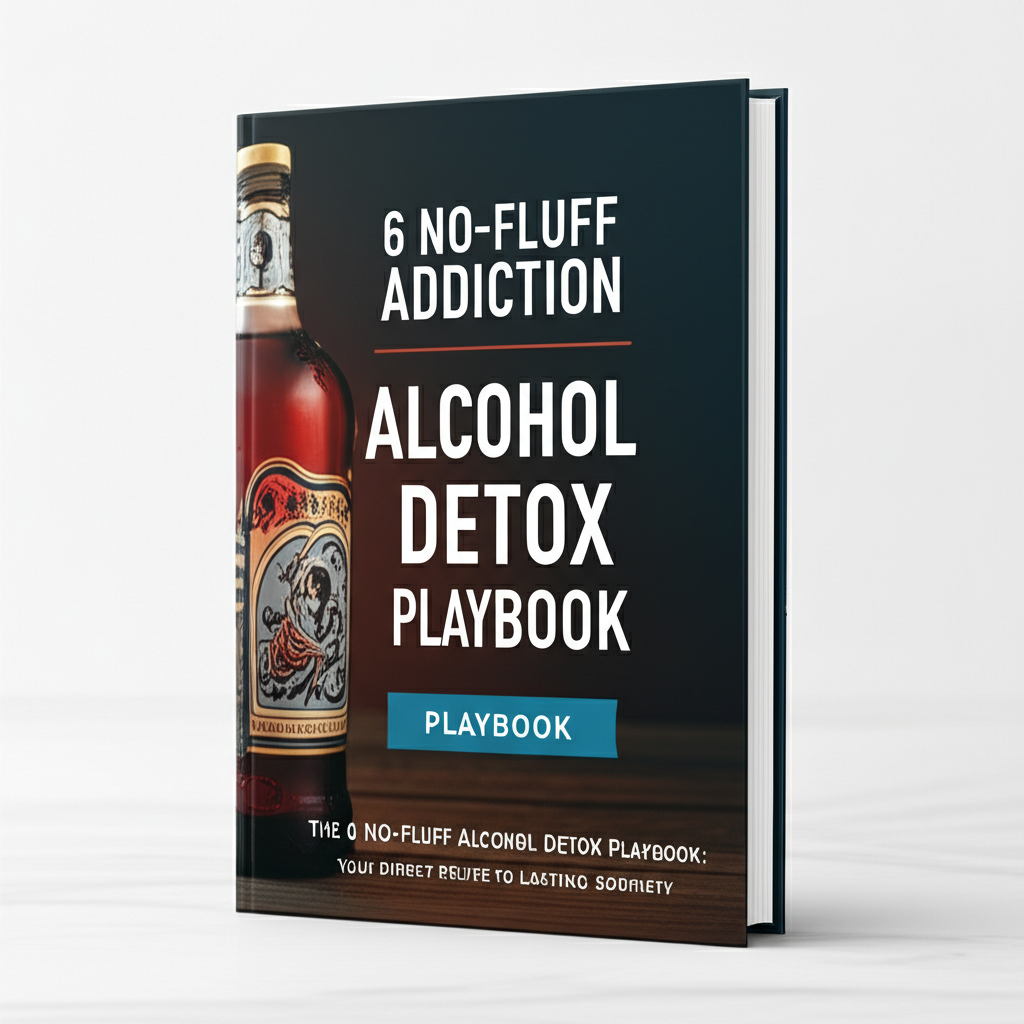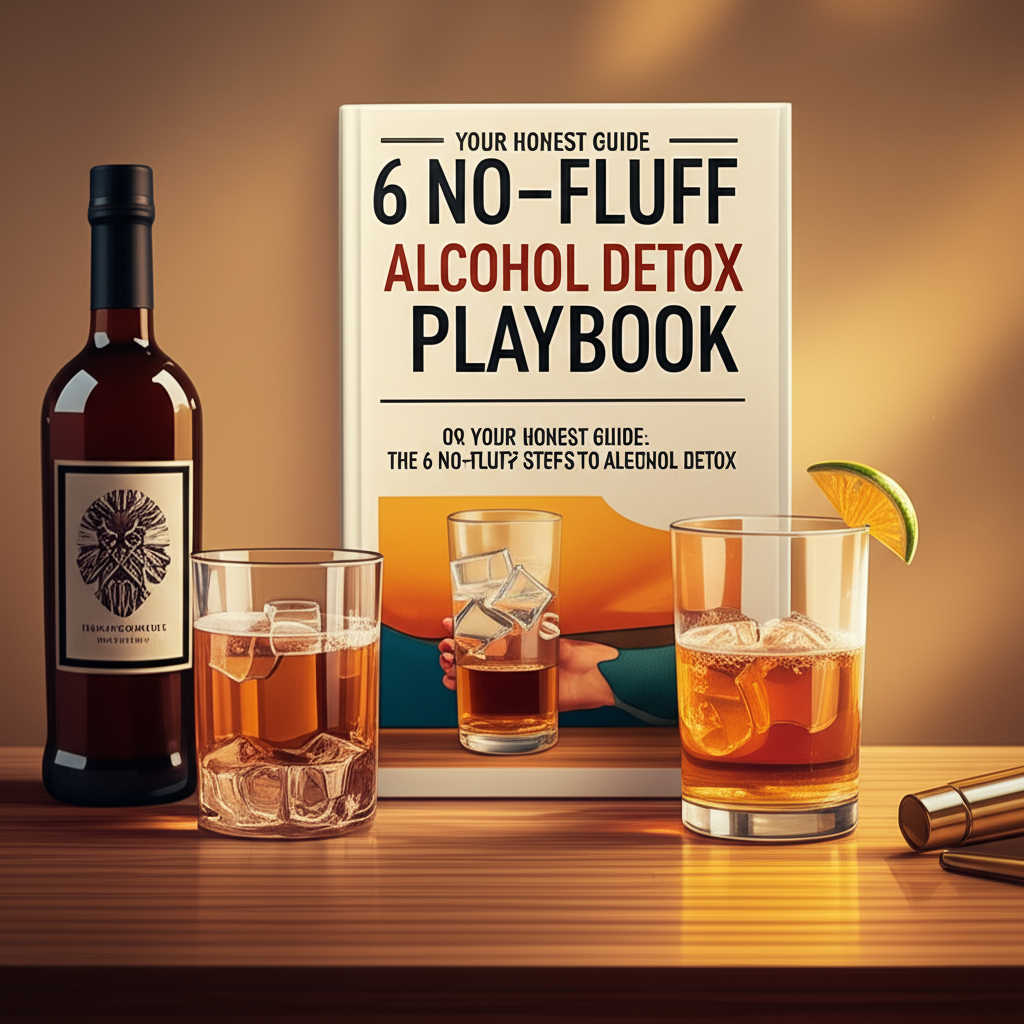The grip of alcohol addiction can feel like an unbreakable chain, tightening its hold with each passing day. For many, the desire to break free is immense, yet the path to sobriety is often shrouded in fear and uncertainty, especially when it comes to the crucial first step: alcohol detox. The prospect of withdrawal symptoms, ranging from uncomfortable to life-threatening, can be a formidable barrier, trapping individuals in a cycle they desperately want to escape.
But what if you had a clear, actionable guide – a "playbook" – to navigate this critical initial phase? What if you understood the different strategies available to ensure your safety and comfort while your body clears itself of alcohol’s influence? This isn’t just about quitting; it’s about doing it safely, effectively, and setting the stage for lasting recovery.
This comprehensive article will unveil 3 essential alcohol detox playbooks, offering a detailed look into the most effective and safest approaches to alcohol withdrawal. We’ll break down each strategy, explain who it’s for, what to expect, and how to maximize your chances of success. Our goal is to demystify the detox process, empower you with knowledge, and illuminate the pathway to a healthier, alcohol-free life.
Understanding Alcohol Withdrawal: Why Detox Matters
Before diving into the playbooks, it’s vital to understand why alcohol detox is such a critical and often medically supervised process. Alcohol, when consumed regularly and in large quantities, fundamentally alters brain chemistry. The central nervous system adapts to the constant presence of alcohol, which is a depressant. When alcohol is suddenly removed, the overstimulated brain goes into overdrive, leading to a cascade of often severe and potentially dangerous symptoms.
The Dangers of "Cold Turkey" Detox
Attempting to detox from alcohol "cold turkey" – without medical supervision – can be incredibly risky, even fatal, especially for individuals with moderate to severe alcohol dependence. The body’s reaction to the sudden absence of alcohol isn’t just discomfort; it’s a physiological shock that can manifest in serious ways:
- Seizures: These can occur within 6-48 hours of the last drink and are a significant risk.
- Delirium Tremens (DTs): A severe and life-threatening form of alcohol withdrawal that typically begins 48-96 hours after the last drink. Symptoms include severe confusion, disorientation, hallucinations (visual, auditory, tactile), rapid heart rate, high blood pressure, fever, and profuse sweating. DTs have a mortality rate if left untreated.
- Cardiovascular Issues: Irregular heartbeats, high blood pressure, and increased risk of heart attack or stroke.
- Dehydration and Electrolyte Imbalance: Vomiting, sweating, and reduced fluid intake can lead to dangerous imbalances.
These aren’t just potential inconveniences; they are serious medical emergencies that underscore the necessity of a structured, informed approach to detox.
Common Alcohol Withdrawal Symptoms
While the severity varies, common withdrawal symptoms can include:
- Physical Symptoms:
- Tremors (shaking hands)
- Nausea and vomiting
- Headaches
- Sweating
- Increased heart rate and blood pressure
- Insomnia
- Loss of appetite
- Fatigue
- Psychological Symptoms:
- Anxiety and panic attacks
- Irritability and agitation
- Depression
- Difficulty concentrating
- Nightmares
- Hallucinations (auditory, visual, tactile – often mild, but can escalate)
Understanding these risks and symptoms highlights why a well-thought-out detox playbook isn’t just helpful – it’s essential for safety and successful transition to recovery.
Playbook 1: The Medical Detox Pathway (The Gold Standard)
For most individuals struggling with moderate to severe alcohol dependence, the medical detox pathway is not just recommended, it’s often a life-saving necessity. This is the "gold standard" because it prioritizes safety, manages symptoms effectively, and provides a stable foundation for the journey ahead.
What is Medical Detox?
Medical detox involves 24/7 medical supervision in a controlled environment, typically a hospital, specialized detox center, or an inpatient rehabilitation facility. The primary goal is to safely manage acute withdrawal symptoms, prevent complications, and stabilize the individual physically and psychologically.
Who is Medical Detox For?
This pathway is crucial for individuals who:
- Drink heavily and consistently: Daily heavy drinking for an extended period.
- Have a history of severe withdrawal symptoms: Including seizures, delirium tremens (DTs), or hallucinations.
- Have co-occurring medical conditions: Such as heart disease, liver disease, diabetes, or mental health disorders (anxiety, depression), which can complicate withdrawal.
- Have a history of previous failed detox attempts: Especially those done without medical supervision.
- Lack a stable and supportive home environment: Where relapse triggers might be prevalent.
The Benefits of Medical Detox
Opting for a medical detox offers a multitude of advantages:
- Safety First: Constant monitoring by medical professionals significantly reduces the risk of life-threatening complications like seizures or DTs.
- Symptom Management: Medications are administered to alleviate withdrawal symptoms, making the process more comfortable and manageable.
- Expert Care: Access to doctors, nurses, and addiction specialists who understand the complexities of alcohol withdrawal.
- Stabilization: Allows the body and mind to stabilize in a safe environment, free from external triggers and pressures.
- Foundation for Treatment: Often serves as the first step into a comprehensive addiction treatment program, ensuring continuity of care.
What to Expect During Medical Detox
The typical medical detox process involves several key stages:
- Comprehensive Assessment: Upon admission, a thorough medical and psychological evaluation is conducted. This includes assessing drinking history, physical health, mental health, and any co-occurring conditions.
- Medication Management: The cornerstone of medical detox. Benzodiazepines (e.g., Librium, Valium, Ativan) are commonly used to prevent seizures, reduce anxiety, and stabilize the central nervous system. Dosing is carefully tapered down over several days.
- Example: A patient might receive a higher dose of Librium initially, which is then gradually reduced over 5-7 days as their withdrawal symptoms subside.
- Continuous Monitoring: Vital signs (heart rate, blood pressure, temperature) are regularly checked. Medical staff are on hand to address any emerging complications immediately.
- Nutritional Support and Hydration: Patients receive fluids and often supplements (like B vitamins, especially Thiamine, to prevent Wernicke-Korsakoff syndrome) to correct nutritional deficiencies common in chronic alcohol users.
- Comfort and Support: A calm, structured environment, often with access to counseling or support groups, helps patients cope with the emotional distress of withdrawal.
- Discharge Planning: As detox concludes, a plan for ongoing treatment (inpatient rehab, outpatient programs, therapy, support groups) is developed to ensure continued sobriety.
Medical detox typically lasts 3-10 days, depending on the individual’s level of dependence and the severity of their withdrawal.
Playbook 2: The Assisted Home Detox Pathway (For Specific Cases)
While medical detox is the safest option for many, a small subset of individuals with milder alcohol dependence might be candidates for an assisted home detox. This pathway should never be attempted without direct medical supervision and strict adherence to professional guidance.
What is Assisted Home Detox?
Assisted home detox involves managing alcohol withdrawal symptoms in the comfort of one’s own home, but under the regular supervision and prescription of a medical doctor. It’s not "doing it yourself"; it’s a doctor-managed process with specific criteria.
Who is Assisted Home Detox For?
This pathway is only appropriate for individuals who meet very specific, strict criteria:
- Mild to Moderate Alcohol Dependence: Those who drink regularly but do not experience severe withdrawal symptoms (no history of seizures, DTs, or severe hallucinations).
- Excellent Physical Health: No significant underlying medical conditions that could be exacerbated by withdrawal.
- Strong, Sober Support System: Living with a responsible, sober adult who can monitor their condition, administer medication as prescribed, and call for emergency help if needed.
- Safe and Alcohol-Free Environment: A home free from alcohol and triggers, conducive to recovery.
- Reliable Transportation: For regular medical appointments and in case of an emergency.
- Commitment to Follow Medical Instructions: Willingness to strictly adhere to medication schedules and doctor’s advice.
The Risks and Requirements of Assisted Home Detox
Even with medical oversight, home detox carries inherent risks compared to an inpatient setting. There is no immediate medical intervention available if complications suddenly arise.
Key Requirements for a Safe Assisted Home Detox:
- Thorough Medical Assessment: A doctor must evaluate the individual’s complete medical history, drinking patterns, and assess the risk of severe withdrawal. This assessment is paramount.
- Prescribed Medication: The doctor will prescribe medications (often benzodiazepines) to manage withdrawal symptoms. These must be taken exactly as directed.
- Regular Check-ins: Daily or near-daily communication with the doctor or a healthcare professional is essential to monitor progress and adjust medication.
- Dedicated Support Person: A trusted individual must be present 24/7 during the acute withdrawal phase to monitor symptoms, administer medication, and respond to emergencies.
- Emergency Plan: A clear plan for what to do if symptoms worsen, including immediate access to emergency services.
Setting Up for Success in an Assisted Home Detox
If approved for home detox, creating the right environment is critical:
- Remove All Alcohol: Eliminate every bottle, can, and trace of alcohol from the home.
- Prepare Comfort Items: Stock up on bland foods, electrolyte drinks, comfort items, and distractions like books or movies.
- Inform Your Support Person: Ensure your designated support person understands their role, the medication schedule, and emergency procedures.
- Hydration and Nutrition: Focus on staying hydrated with water and electrolyte drinks, and try to consume light, nutritious meals.
Assisted home detox is a viable option for a select few, but it must be approached with extreme caution and under strict medical supervision.
Playbook 3: The Holistic Support Pathway (Crucial for Any Detox)
Regardless of whether you choose a medical detox or an assisted home detox, the holistic support pathway is not just an add-on; it’s an essential and non-negotiable component of any successful detox and the foundation for long-term recovery. This playbook addresses the whole person – mind, body, and spirit – recognizing that addiction is a complex issue extending far beyond physical dependence.
Beyond the Physical: Addressing the Whole Person
Detox is the process of getting alcohol out of the body. Recovery is the process of keeping it out. Holistic support bridges this gap by addressing the underlying reasons for addiction and equipping individuals with tools for sustained sobriety.
Building a Robust Support System
Feeling isolated is a common trigger for relapse. A strong support system is vital:
- Family and Friends: Educate loved ones about the recovery process and ask for their understanding and support.
- Peer Support Groups: Organizations like Alcoholics Anonymous (AA), SMART Recovery, and other mutual-aid groups offer invaluable peer support, shared experiences, and a sense of community.
- Example: Attending daily AA meetings during and after detox provides a safe space to share struggles and gain encouragement.
- Sponsor/Mentor: A sponsor (in AA) or mentor (in other programs) can provide personal guidance, accountability, and support based on their own recovery journey.
- Therapy and Counseling:
- Individual Therapy: Working with a therapist (e.g., cognitive-behavioral therapy (CBT), dialectical behavior therapy (DBT)) helps identify triggers, develop coping mechanisms, and address underlying mental health issues.
- Group Therapy: Offers a supportive environment to share experiences and learn from others.
Nutritional Support and Hydration
Chronic alcohol abuse often leads to severe nutritional deficiencies, which can exacerbate withdrawal symptoms and hinder recovery.
- Replenish Nutrients: Focus on a balanced diet rich in fruits, vegetables, lean proteins, and whole grains.
- Key Vitamins: Pay special attention to B vitamins (Thiamine, Folate), Vitamin C, and Magnesium. These are often depleted by alcohol.
- Stay Hydrated: Water and electrolyte-rich fluids (coconut water, clear broths) are crucial to combat dehydration and support bodily functions.
- Avoid Sugar and Caffeine: While tempting, excessive sugar and caffeine can worsen anxiety and disrupt sleep during early recovery.
Mind-Body Connection and Stress Management
Learning healthy coping mechanisms for stress, anxiety, and cravings is paramount.
- Mindfulness and Meditation: Practices that help ground you in the present moment, reduce anxiety, and cultivate self-awareness.
- Yoga and Tai Chi: Gentle physical activities that combine movement with breathwork, promoting relaxation and mental clarity.
- Deep Breathing Exercises: Simple techniques that can quickly calm the nervous system during moments of stress or craving.
- Light Exercise: Once physically able, activities like walking can boost mood, improve sleep, and release endorphins.
- Journaling: A powerful tool for processing emotions, identifying triggers, and tracking progress.
Planning for Long-Term Recovery
Detox is merely the first step. The holistic support pathway ensures that a comprehensive plan for ongoing sobriety is in place.
- Aftercare Programs: Many inpatient facilities offer structured aftercare, which can include continued therapy, support groups, and relapse prevention planning.
- Relapse Prevention Strategies: Developing a clear plan for identifying and managing high-risk situations, understanding personal triggers, and having immediate steps to take if cravings arise.
- Healthy Hobbies and Activities: Re-engaging with old passions or discovering new ones provides purpose, joy, and healthy alternatives to drinking.
- Goal Setting: Setting realistic short-term and long-term goals for recovery, personal growth, and life improvements can be incredibly motivating.
Choosing Your Playbook: A Critical Decision
The decision of which detox playbook to follow should never be made lightly or in isolation. It is a critical, potentially life-altering choice that demands professional guidance.
Key Factors to Consider (with a medical professional):
- Severity of Alcohol Dependence: How much and how often do you drink?
- History of Withdrawal Symptoms: Have you experienced severe symptoms (seizures, DTs) before?
- Overall Physical and Mental Health: Any co-occurring conditions?
- Home Environment and Support System: Is your home safe and supportive, or are there significant triggers?
- Access to Resources: What medical and financial resources are available for different types of care?
Always consult a doctor, addiction specialist, or a reputable detox facility to get a personalized assessment and recommendation. They can evaluate your specific situation and guide you towards the safest and most effective detox strategy.
Conclusion: Your First Step Towards Freedom
Embarking on the journey of alcohol detox is undoubtedly one of the bravest decisions you can make. It signifies a profound commitment to reclaiming your health, your relationships, and your future. The fear surrounding withdrawal is real and valid, but with the right knowledge and support, it is a challenge that can be overcome safely and successfully.
We’ve explored 3 essential alcohol detox playbooks:
- The Medical Detox Pathway: The safest and most recommended option for moderate to severe dependence, offering 24/7 supervision and medication management.
- The Assisted Home Detox Pathway: A highly selective option for mild dependence, requiring strict medical oversight and a robust home support system.
- The Holistic Support Pathway: An indispensable layer of care for any detox, focusing on psychological well-being, nutritional recovery, stress management, and long-term sobriety planning.
Remember, detox is not the end of the journey; it’s the vital first step. By understanding these playbooks and choosing the path best suited for your individual needs – always in consultation with medical professionals – you equip yourself with the tools to navigate withdrawal safely and effectively. This comprehensive approach ensures that you not only get sober but also build a sustainable foundation for a fulfilling, alcohol-free life.
Don’t let fear dictate your future. Take that courageous first step. Seek professional help, understand your options, and begin writing your own playbook for lasting recovery. Your freedom awaits.








